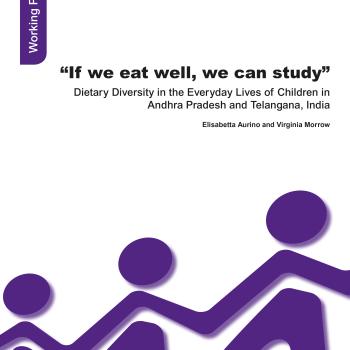
This paper investigates young people’s and their caregivers’ experiences of food insecurity, diet and eating practices in Andhra Pradesh and Telangana. It also provides original child-focused evidence on perceptions of government food programmes such as the Midday Meal Scheme and the Targeted Public Distribution System. The paper analyses three rounds of longitudinal qualitative data and one round of survey data from Young Lives. We found that:
access to good-quality food is a key preoccupation for children and families in low-income households; there is widespread awareness of the importance of a good diet for health, nutrition and cognition (among children as well as caregivers), irrespective of their age, education or income levels; quality of diet is sensitive to the precarious economic circumstances in which families find themselves, and is affected by food price rises and drought; food programmes, particularly school meals, are generally seen as valuable safety net interventions, although concerns emerged regarding the quality of the food provided, in private schools and hostels as well as government schools.
The paper concludes that children’s experiences are important to take account of when public programmes are implemented, and that there are high levels of awareness of the importance of dietary diversity that could be built upon in health and nutritional programmes.

This paper investigates young people’s and their caregivers’ experiences of food insecurity, diet and eating practices in Andhra Pradesh and Telangana. It also provides original child-focused evidence on perceptions of government food programmes such as the Midday Meal Scheme and the Targeted Public Distribution System. The paper analyses three rounds of longitudinal qualitative data and one round of survey data from Young Lives. We found that:
access to good-quality food is a key preoccupation for children and families in low-income households; there is widespread awareness of the importance of a good diet for health, nutrition and cognition (among children as well as caregivers), irrespective of their age, education or income levels; quality of diet is sensitive to the precarious economic circumstances in which families find themselves, and is affected by food price rises and drought; food programmes, particularly school meals, are generally seen as valuable safety net interventions, although concerns emerged regarding the quality of the food provided, in private schools and hostels as well as government schools.
The paper concludes that children’s experiences are important to take account of when public programmes are implemented, and that there are high levels of awareness of the importance of dietary diversity that could be built upon in health and nutritional programmes.

